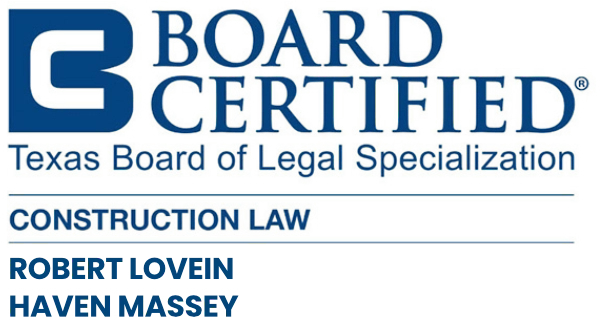Contractor’s Failure to Pay Subcontractors
Has your contractor failed to pay its subcontractors or suppliers? Pursuant to the Texas Trust Fund Statute, a contractor is a “trustee” of construction funds it receives from the homeowner and is required to use those funds to pay its subcontractors/suppliers. The contractor’s failure to use project funds to pay project related costs is a direct violation of the Trust Fund Statute and potentially a felony. In addition, pursuant to the Texas Prompt Payment Act, a contractor is required to pay its subcontractors/suppliers within 7 days from receiving payment from the homeowner. The good news is that since the homeowner did not directly hire the contractor’s subcontractors and suppliers, the only way a homeowner can become obligated to pay the contractor’s subcontractors or suppliers, is if the subcontractor/supplier timely served the owner with a proper pre-lien notice and timely filed a lien. This rarely occurs. Moreover, as discussed below, if the property is a homestead property (meaning your primary residence) then no one has the right to record a lien against your property unless there is a written contract signed by the contractor and both spouses if the homeowners are a married couple. There is no exception to this rule. Even with that said, if you have received a pre-lien notice from your contractor’s subcontractor/supplier, you will want to resolve the issue before the subcontractor/supplier files a lien because it is much more difficult and costly to remove a lien once it has been filed. If your contractor has not paid its subcontractors/suppliers, please contact us so we can discuss how we can protect your rights. You can find out how to sue a pool contractor in Texas here.
Removal of Invalid Mechanic’s Lien
Has a contractor or supplier filed a lien against your property? Are you anticipating or already experiencing problems with obtaining permanent financing, refinancing, or selling the property. If so, you need a quick solution to what may become a very big problem. Obviously you could just pay off the lien holder or “bond around the lien.” However, you are likely disputing that the money (or a portion of it) is owed or are claiming that it is owed by someone else, like your contractor or one of his subcontractors. Hence, paying the lien holder or filing a bond to indemnify the lien holder, are not preferred solutions! So what can you do? If you have not already, you need to retain a construction lawyer to analyze the lien documents and determine whether they were properly prepared and timely filed in accordance with the Texas Property Code. The Texas lien laws are strictly enforced by our courts and a failure to comply with these rules may result in an invalid lien. Even if the money is owed, if the lien laws were not followed, the lien may not be enforceable! Contractors, and surprisingly even lawyers who do not specialize in construction law misunderstand the Texas lien laws all of the time and consequently file bad liens. See below for how to prevent or remove an invalid lien.
The Stipulated Sum or Lump Sum Contract
When you retain a builder/contractor to either build or improve your home under a Lump Sum or Stipulated Sum Contract, the builder/contractor is obligated to build/improve the house for the agreed upon contract amount. Surprisingly, there are a lot of contractors who do not understand this simple contractual requirement and attempt to charge the homeowner for cost overruns. However, when a contractor signs a lump sum contract, the contractor assumes the risk of cost overruns and is obligated to perform the work for the agreed upon price, setting aside any agreed upon extra work. If your contractor is demanding money above the lump sum amount and/or refusing to complete the work until you have paid more money, the contractor is likely in default of the contract. For more on how to sue a contractor in Texas, go here.
How to Initiate a Claim against Your Builder/Contractor Under Chapter 27
Residential construction defects are common and builders/contractors are notorious for failing to respond to customer complaints, honor warranties, and correct defective work. To initiate a formal claim against your builder/contractor, you must follow the statutory procedures outlined in Chapter 27 of the Texas Property Code. In 1989, the Texas Legislature enacted Chapter 27 “to promote settlement between homeowners and contractors, and to afford contractors the opportunity to repair their work in the face of dissatisfaction.” Chapter 27 is a mandatory statute and must be followed to make a valid claim against a builder/contractor. Chapter 27 applies to both new home construction and residential remodel projects, and is applicable to both the original homeowner and any subsequent home purchaser. A new home contract or remodel contract subject to Chapter 27 must contain a disclosure statement in at least 10 bold font outlining the Chapter 27 requirements. Failure to include this notice in the contract subjects the builder/contractor to a penalty of $500.00.
A chapter 27 claim is initiated by preparing and sending a formal notice to the builder/contractor by certified mail at the builder/contractor’s last known address, specifying in reasonable detail the construction defects and cost to repair, if known. If available, the notice should be supported by evidence, such as inspection reports, photographs, video recordings, and repair estimates. This initial notice is a very important step in the Chapter 27 process and should be prepared by a qualified construction attorney.
In response to the notice, the builder/contractor, upon written request, has the right to inspect, test, and document the defects. Within no later than 45 days after the builder/contractor receives the notice, the builder/contractor may make a written offer of settlement to the homeowner. The offer may include either an agreement by the builder/contractor to repair the defects or have the defects repaired by an independent contractor at the builder/contractor’s expense. The repairs shall be made within 45 days from when the builder/contractor receives notice of acceptance of the offer by the homeowner. If the builder/contractor makes a written offer of which the homeowner deems unreasonable, the homeowner has 25 days to respond in writing to the builder/contractor outlining the basis for the rejection, thereby giving the builder/contractor an additional 10 days to present a counter-offer. If the homeowner rejects a reasonable offer, or does not allow the builder/contractor an opportunity to inspect/repair the defects, the homeowner’s potential recovery through a lawsuit and/or arbitration will be limited to the original offer and the homeowner’s attorney’s fees will be limited to those incurred before the reasonable offer was made.
Chapter 27 limits the nature and type of damages a homeowner may recover against a builder/contractor to the following: (1) the reasonable cost to repair the construction defects; (2) the reasonable cost to repair or replace any damaged personal property caused by the construction defects; (3) reasonable and necessary engineering and consulting fees; (4) reasonable expense for temporary housing incurred during the repairs; (5) the reduction in current market value, if any, after the construction defects are repaired if the defects are structural in nature; and; (6) reasonable attorneys’ fees and litigation costs. If the construction defects are greater than $7,500.00, the court may, upon filing a motion, compel the parties to mediate the dispute at the outset of litigation.
























